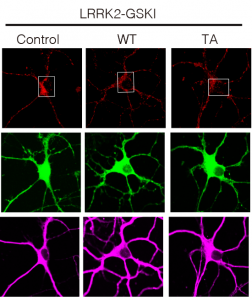As posted in UConn Today
September 15, 2021 | Kim Krieger UConn Communications
Mutations in a protein known to cause Parkinson’s Disease derange transportation in and out of brain cells, reports a team of UConn Health researchers in the 27 July issue of Science Signaling. The toxic traffic jams that result eventually lead to certain brain cell death and the characteristic symptoms of Parkinson’s.
“We figured out how LRRK2 causes dopaminergic neurodegeneration,” the break down and death of brain cells that control the movement of our body, says Yulan Xiong, a neuroscientist in UConn Health’s School of Medicine. LRRK2 is a gene that codes for a protein in our brain. The mutation affects a multi-step process and eventually causes protein to clog the doorways into the cell.
